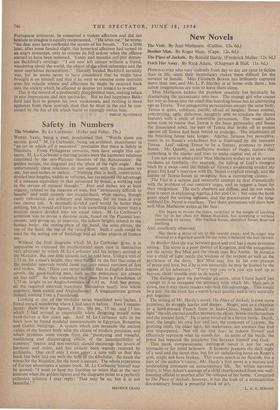New Novels
PERSONALITIES who vary violently from day to day are rarer in fiction than in life, since their inconstancy makes them difficult for the novelist to handle. Miss Elizabeth Bowen has brilliantly captured more than one, and Mr. L. P. Hartley is at home with them ; less subtle imaginations are wise to leave them alone.
Miss Matheson tackles the problem unsubtly but heroically by dramatising the inconstancy into two. The strange girl who coaxes her way as Susan into the small dim boarding house has an alternating ego as Teresa. Two antagonistic personalities occupy the same body. Teresa is quiet, subdued, pacific, afraid of heights: Susan amoral, enterprising, agile, dishonest, naughtily able to irradiate the shared features with a smile of irresistible persuasion. The reader takes, some time to realise that Teresa is the basic personality and Susan the dissociated rebel, the part of Teresa that broke off in protest against all Teresa had been forced to undergo. The inhabitants of the boarding house take longer. Agatha, fatuous but perceptive, tunes in to Susan's wickedness but is frustrated by the innocent Teresa. Leaf, taking Teresa to be a fantasy, promises to marry Susan. Mr. Quinby, an ineffective student of magic, realises that something is the matter and tries to make capital out of it.
1 am not sure to what extent Miss Matheson wishes us to see certain incidents as symbolic—for example, the killing of Leaf's mongrel bitch by a swan—and the details of Teresa's awakening evaded my grasp; but Leaf's interview with Dr. Nepal is explicit enough, and the failure of Teresa-Susan to recognise him a convincing climax.
The Visit is a serious and successful attempt to deal dramatically with the problem of our contrary urges, and to suggest a hope for their integration. The early chapters are diffuse, and far too much time is spent in explaining Agatha, Lilsy and Co. ; but once the book gains speed the writing tightens, and the presentation of the long- withheld Dr. Nepal is excellent. Two short quotations will show how well Miss Matheson writes at her best:
She began to mount the stairs, surprised at the weight of loathing that lay in her chest for Susan Standish, but accepting it without examining its causes. She loathed Susan, therefore Susan deserved loathing.
And, excellently observed:
She threw a sliver of ice at the nearest swan; and its anger was diverted to a dignified search for the titbit it believed she had thrown.
•
In Brother Man the war between good and evil has a more primitive
setting. The scene is a poor district of Kingston, and the antagonists are the saintly Bra'Man and the obeah man Bra'Ambo. In Jamaica too a child of light needs the wisdom of the serpent as well as the gentleness of the dove. Bra' Man may live by his own precept of peace and love, but if he is too unworldly he may be framed by the agents of his adversary. "Every way you tu'n you' eye look up is heaven, child; trouble only in de world."
The dialogue gave me particular pleasure, since I have heard just enough of it to recognise the accuracy with which Mr. Mais sets it down, but it may daunt readers who lack this advantage. This would be a pity, for the book has a warm lyrical quality, and is very naturally put together.
The setting of Mr. Hardy's novel, The Place of Jackals, is even more primitive, its struggle harder and deeper. Roget, sent as a chaplain to a hard-pressed French force in Indo-China, braces himself to fight" the old, eternal conflict between the clever, brittle intellectualism and the ancient faith." He is soon involved in a fiercer battle. Death, heat, the jungle, his own fear and lust, the contempt of Lejeunc, the grinning idols, the older faith, his uselessness, are enemies that find hint unprepared. Not till the end does he redeem himself and effectively' represent what he stands for. in terms of the battle, the priest has repaired the telephone line between himself and God.
This stern, compassionate, astringent novel is not for weak stomachs or for timid believers. It honestly presents the dark night of a soul and the dawn that, but for an unbelieving hand on Roget's arm, might not have broken. This ironic touch is no flourish, but a part of the author's vision. Mr. Hardy's first novel is a mature and unshrinking comment on contemporary life. So, within narrower limits, is Miss Adam's account of a child shuttlecocked_from one well- meaning official to another after the collapse of her home. Compared to The Place of Jackals, however, it has the look of a conscientious documentary beside a powerful work of art.
L. A. G. STRONG


















































 Previous page
Previous page